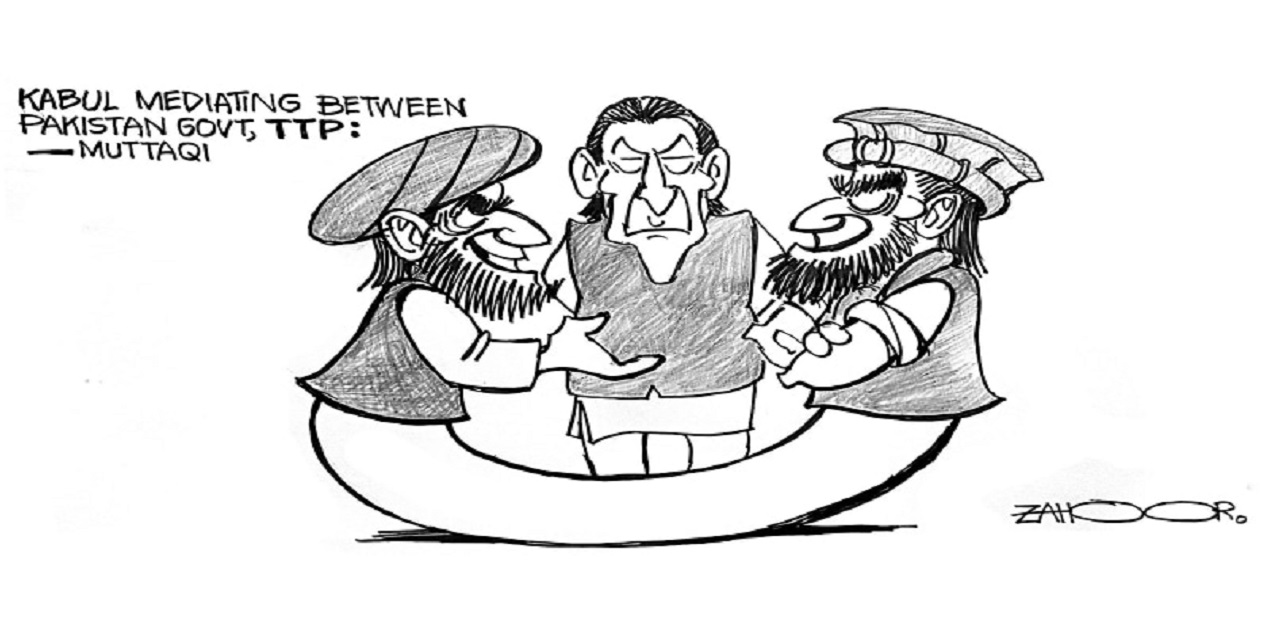About 57 members of jirga comprising of some very prominent officials like former ISI chief and current Peshawar Corps Commander Lt Gen Faiz Hameed, Federal Minister Sajid Hussain Toria, Mohammad Ali Seif, Senior State Counselor Shaukatullah Khan, former Governor Senator Dost Mohammad Mehsud, Senator Hilal Mohmand and General Jamal gathered last week in Kabul for a negotiation with the outlawed Tehreek-i-Taliban (TTP) leader Mufti Noor Wali Mehsud.
Tehreek-i-Taliban Pakistan (TTP) was established in 2007 as a by-product of politics between the jihadist group in the post 2001 US invasion of Afghanistan. TTP claimed to be an off shoot of Afghan Taliban, and had connections with Al Qaeda as well.[1] The deobandi- wahhabi Sunni group has been carrying out tartgeted attacks against Pakistan’s military personnel and infrastructure. TTP has been focussing on the Pakistan’s exploitative state policies.
The representatives of the two sides visited Afghanistan for negoatiations, where the Islamic Emirate's acting Prime Minister Mullah Akhund played the role of mediator between the government of Pakistan and TTP leaders. TTP and the Government of Pakistan are in conflict since last two decades. The militant group, which is based out of South Waziristan, has three primary objectives firstly, to reverse the merger of Federally Administered Tribal Areas with Khyber-Pakhtunkhwa province; secondly, to introduce a Sharia-based Islamic system in Pakistan and thirdly, to let TTP open a political office in a third country.[2]
The conflict between the two parties dates back to 2014, when the Pakistani military launched the Operation Zarb-e-Azb in the North Waziristan Agency (NWA). The objective of this operation was to flush out all the terrorists from the region, primarily targeting the TTP militants. While doing so, it also tortured and killed indiscriminately the innocent Pashtun people.
Pakistani army has been struggling for a long time to thwart the TTP's influence amongst the thriving religio-political ecosystem and among the young Pashtuns settled in the bordering areas. TTP’s unrelenting fight has been challeneging the Pakistan government’s claim over the region.
Rewinding the History
In 1893, Sir Mortimer Durand haphazardly drew the Durand Line, which not only divided the Pashtun tribe into two halves but also created many a rift for the future generations to deal with.[3] This border issue is a bone of contention between the present-day Afghanistan and Pakistan. The Pashtuns in the FATA region were governed under the 1901 British law called Frontier Crimes Regulation (FCR), which allowed the Pashtuns internal autonomy and to follow their own tribal laws.[4] This status quo continued under the newly created state of Pakistan, and with time this region became lawless and gave birth to warlordism. The Pakistani army further used this mess in the region during the 1979 Soviet invasion and the war on terror operation in 2001. Over a period of time FATA had become an incubator of terrorism which Pakistan very much raised for its interests on two fronts, first against India in a proxywar in Kashmir and secondly, for extracting money out of the Central Intelligence Agency (CIA). However, it became a challenge for Pakistan when it tried to abandon its adopted child-the Taliban gradually. Under US pressure, then-President Musharraf launched half-hearted unweildy operations against the terror -groups in FATA.
During these combing operations in FATA, several innocent Pashtuns were executed. This created grave animosity between the Pashtun tribals and the Pakistan military. Eventually, the militant organisation working for Pakistan turned around to bite the hands of the army, followed by the creation of TTP in 2007. Since then, TTP’s singular objective is to overthrow the Pakistan government. In 2017, Pakistani parliament under the 25th Amendment reformed the constitution and repealed the FCR.[5] This constitutional change had upset both TTP and Afghan Taliban, disturbing the entire equilibrium of the region.
Recent Developments
With the Taliban's comeback in August 2021, several terror groups, including TTP, applauded the Taliban for their unwavering commitment and pledged to follow in their footsteps. This raised concerns for the Pakistan government, which has been facing constant challenges from the radicalgroups that calls Pakistan's constitution "un-Islamic".
In 2021, Imran Khan's government and the President offered to negotiate with TTP members, followed by a short term ceasefire for three months. However, the truce was stalled after the TTP accused the government of Pakistan of raiding their areas of influence. This ended the peace deal in a short period of one month in December 2021. Since then, there has been a spike in the number of attacks carried out by TTP.[6]
In 2022, the two sides met again, intending to find a solution, however, there was no effective outcome. Later, the Pakistan government refused to consider the demands of the TTP to impose Sharia in Pakistan and repeal the 2018 amendment of the Frontier Crimes Regulation (FCR), which is now replaced with the FATA Interim Governance Regulation, 2018.[7] This amendment had also removed the semi-autonomous status of FATA.
However, despite all the failings, the two sides have extended the ceasefire indefinitely and continued the negotiations. The Islamic Emirate of Afghanistan (IEA) counselled Pakistan that as a part of the Confidence Building Measure (CBM) to consider TTP’s demand for the release of its two key personnel, including the SWAT spokesperson Muslim Khan apart from compensation to the families of the killed TTP members. Further, on two aspects, the Government of Pakistan remained firm: the disbandment of the TTP as a militant organisation and the reversal of the FATA merger.[8]
Faultlines in Pakistan
Pakistan has had a skewed approach to terrorism. And therefore, it would make these tall promises of launching operations against the terror groups winning international support, funding, and diplomatic backing. But at the same time, it will provide a safety net to the terrorists by keeping them under house arrest for a while and later releasing them. Therefore, they could sustain the jihadi infrastructure and use it against India to pursue larger strategic goals. As a result, despite so many attempts, Pakistan has failed to come out of the Grey List of Financial Action Task Force (FATF). Even their recent air strikes[9] against TTP in April 2022 in North Eastern Kunar and Khost province of Afghanistan seemed orchestrated to show their comittment in fighting terrorism.[10]
Requisites for Resolution
As negotiations have failed in bringing concrete solutions there is a need for introspection on the part of the the armed group which may consider disarming itself as a part of the process in the first place. Next, it must be clear which faction within the TTP is ready to reconcile as it is made up of several factions. If, in case the reconciliation is partial, the entire exercise will be completely futile. Finally, all the stakeholders of the FATA region, mainly the Pashtun leaders like PTM Chief Manzoor Pashteen, Pashtun Human Rights activists Gulalai Ismail and the TTP members, must be involved to get to the roots of the problem.
Pakistan's fight against terrorism raises several doubts, given its patchy background in counter-terrorism success. Pakistan's approach of bringing one group against another has not been successful and is unlikely to bring it any success in the future. There is no doubt that Pakistan Army will go all out against the TTP. But the question of Pakistan and its strategy of counter-terrorism will more likely remain questionable. Because as long as Pakistan continues to support the Afghan Taliban and views the two factions of Taliban as different, the problem cannot be resolved. It is not a riddle that the presence of the Taliban in Afghanistan strengthens TTP because the bottom line truth is that the Taliban-TTP relations have some ideological alignment seeking to implement Sharia.
Further, unless Pakistan stops sheltering the terrorist groups like Lashkar-e-Taiba, and Jamaat ud-Dawa, the challenge of terrorism cannot be resolved within Pakistan or in neighbouring countries like India. It's probably time for Pakistan to break its ties with the religio-terrorist ecology to secure its territories and ensure internal security.
Endnotes :
[1] Surrender Sharma and Soumya Awasthi, A compendium of Terrorist Groups, Vivekananda International Foundation, New Delhi, 2022, pp. 147-157
[2] Kamran Yousaf, “TTP wants ‘political office’ in thrid country”, The Express Tribune, November 20, 2021, https://tribune.com.pk/story/2330336/ttp-wants-political-office-in-third-country
[3] Editor, “Durand Lime”, Britanica, n.d, https://www.britannica.com/event/Durand-Line
[4] Vivek Katju, “How the FATA- Khyber Pakhtunkhwa Merger will change the Region Forever”, The Wire, June 25, 2018, https://thewire.in/south-asia/how-the-fata-khyber-pakhtunkhwa-merger-will-change-the-region-forever
[5] Ibid.
[6] Dawn, “On again, off again: A Timeline of Government-TTP Talks”, Dawn, December 10, 2021, https://www.dawn.com/news/1660188
[7] Munir Ahmed, “Pakistan send team to Kabul to discuss Ceasefire with Tehrik-i-Taliban Pakistan”, The Diplomat, June 02, 2022, https://thediplomat.com/2022/06/pakistan-sends-team-to-kabul-to-discuss-ceasefire-with-tehrik-e-taliban-pakistan/
[8] Ismail Khan, “Islamabad, TTP agree on indefinite ceasefire”, Dawn, May 31, 2022, https://www.dawn.com/news/1692383
[9] Aljazeera, “Taliban Issues warning over civilians killed by Pakistan Rocket”, Aljazeera, April 16, 2022, https://www.aljazeera.com/news/2022/4/16/pakistani-troops-killed-in-armed-ambush-near-afghanistan-border
[10] News Desk, “Explained: Why did Pakistan Launch Airstrikes on Afghanistan?”, The Indian Express, May 4, 2022, https://indianexpress.com/article/explained/explained-pakistan-airstrikes-afghanistan-7896325/
(The paper is the author’s individual scholastic articulation. The author certifies that the article/paper is original in content, unpublished and it has not been submitted for publication/web upload elsewhere, and that the facts and figures quoted are duly referenced, as needed, and are believed to be correct). (The paper does not necessarily represent the organisational stance... More >>
Image Source: https://i.dawn.com/primary/2021/11/61945945d1054.jpg










Post new comment